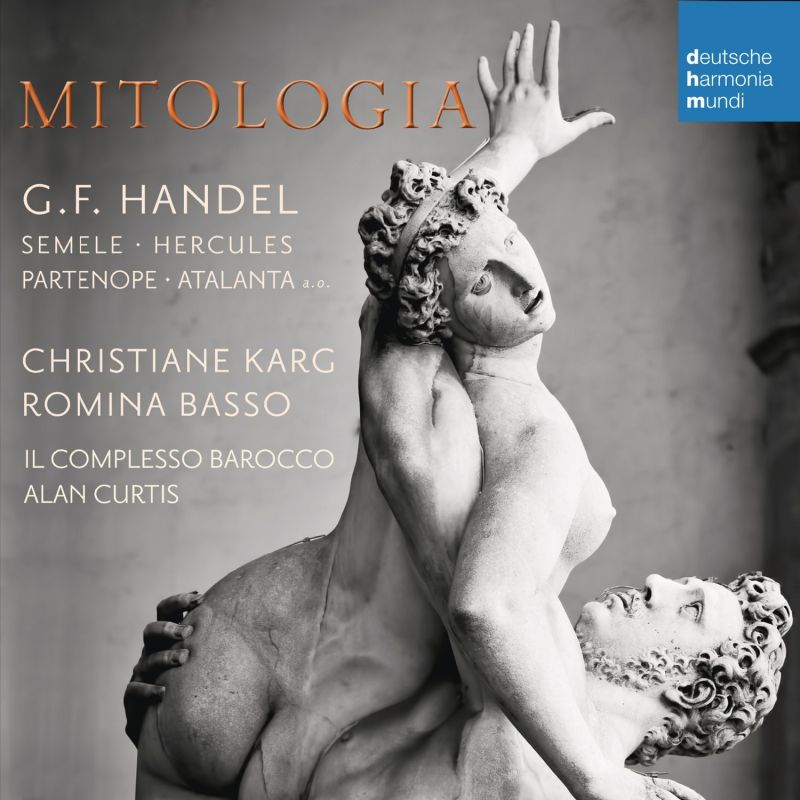Mitologia
View record and artist detailsRecord and Artist Details
Composer or Director: George Frideric Handel
Genre:
Opera
Label: Deutsche Harmonia Mundi
Magazine Review Date: 12/2016
Media Format: CD or Download
Media Runtime: 70
Mastering:
DDD
Catalogue Number: 88875 19981-2

Tracks:
| Composition | Artist Credit |
|---|---|
| Arianna in Creta, Movement: Bell’idol amato |
George Frideric Handel, Composer
(Il) Complesso Barocco Alan Curtis, Conductor Christiane Karg, Soprano George Frideric Handel, Composer Romina Basso, Mezzo |
| Arianna in Creta, Movement: Deh, taci crudel |
George Frideric Handel, Composer
(Il) Complesso Barocco Alan Curtis, Conductor Christiane Karg, Soprano George Frideric Handel, Composer Romina Basso, Mezzo soprano |
| Atalanta, Movement: ~ |
George Frideric Handel, Composer
(Il) Complesso Barocco Alan Curtis, Conductor Christiane Karg, Soprano George Frideric Handel, Composer Romina Basso, Mezzo soprano |
| Partenope, Movement: ~ |
George Frideric Handel, Composer
(Il) Complesso Barocco Alan Curtis, Conductor Christiane Karg, Soprano George Frideric Handel, Composer Romina Basso, Mezzo soprano |
| Apollo e Dafne, '(La) terra è liberata', Movement: Aria: Felicissima quest'alma |
George Frideric Handel, Composer
(Il) Complesso Barocco Alan Curtis, Conductor Christiane Karg, Soprano George Frideric Handel, Composer Romina Basso, Mezzo soprano |
| Echeggiate, festeggiate numi eterni |
George Frideric Handel, Composer
(Il) Complesso Barocco Alan Curtis, Conductor Christiane Karg, Soprano George Frideric Handel, Composer Romina Basso, Mezzo soprano |
| Hercules, Movement: Where shall I fly? |
George Frideric Handel, Composer
(Il) Complesso Barocco Alan Curtis, Conductor Christiane Karg, Soprano George Frideric Handel, Composer Romina Basso, Mezzo soprano |
| (Il) Parnasso in Festa, Movement: Dopo d’aver perduto il caro bene…Ho perso il caro ben |
George Frideric Handel, Composer
(Il) Complesso Barocco Alan Curtis, Conductor Christiane Karg, Soprano George Frideric Handel, Composer Romina Basso, Mezzo soprano |
| (Il) Parnasso in Festa, Movement: Già le furie vedo ancor |
George Frideric Handel, Composer
(Il) Complesso Barocco Alan Curtis, Conductor Christiane Karg, Soprano George Frideric Handel, Composer Romina Basso, Mezzo soprano |
| Semele, Movement: Overture |
George Frideric Handel, Composer
(Il) Complesso Barocco Alan Curtis, Conductor Christiane Karg, Soprano George Frideric Handel, Composer Romina Basso, Mezzo soprano |
| Semele, Movement: Come, Zephyrs, come |
George Frideric Handel, Composer
(Il) Complesso Barocco Alan Curtis, Conductor Christiane Karg, Soprano George Frideric Handel, Composer Romina Basso, Mezzo soprano |
| Semele, Movement: ~ |
George Frideric Handel, Composer
(Il) Complesso Barocco Alan Curtis, Conductor Christiane Karg, Soprano George Frideric Handel, Composer Romina Basso, Mezzo soprano |
Author: Richard Wigmore
With five arias, Christiane Karg has the lion’s share of this attractively varied programme. As ever, the German soprano ‘lives’ each of the characters intensely: in the blanched, grief-etched tone she brings to Orfeo’s lament from Parnasso in festa, in Cupid’s seductive ‘Come, Zephyrs, come’, sung with just the right knowing coquettishness, or as Semele sarcastically insisting that Jupiter reveal himself in his true guise. In dialogue with the alluring (unnamed) oboist, Karg embodies the vernal innocence of Dafne’s ravishing ‘Felicissima quest’alma’ and uses the faint edge on her tone to advantage in Partenope’s vigorous defence of the unstable Arsace. Although her English is good, consonants (especially final consonants) could sometimes be clearer; and while she invariably ups the intensity in da capos, her elaborate embellishments can smother Handel’s original melodic lines.
Romina Basso, too, is not shy over ornamentation, going manically berserk in the da capo of Jupiter’s celebratory aria ‘Echeggiate, festeggiate’. Her firm, slightly androgynous mezzo and fiery temperament immediately impress in the tremendous ombra aria from Parnasso in festa (recyled from the oratorio Athalia). In the famous ‘mad scene’ from Hercules Basso does not hold back as the despairing, raving Dejanira, though her strongly accented English is only intermittently decipherable (which probably wouldn’t have worried the cosmopolitan Handel) and her lowest notes lack body. She and Karg make vivid, well-matched duet partners, whether in their euphoniously blended thirds and sixths in the Atalanta love duet, or the frisson of the duet in which Theseus seeks to reassure a distraught Ariadne of his constancy. If Curtis’s direction tends to be stronger on elegance than dramatic energy, he invariably draws neat, pointed playing from his expert period band.
Although all the numbers were recorded in the same venue, the balances are inconsistent. Basso sounds much more closely miked than Karg, while the over-prominence of pizzicato violins and boomy double bass compromises the Arcadian enchantment of ‘Felicissima quest’alma’. Minor irritants aside, this is an enjoyable, unclichéd programme, above all for Christiane Karg’s contribution, and a worthy memorial to a Baroque pioneer who revived so many forgotten operas by Handel, Vivaldi et al.
Discover the world's largest classical music catalogue with Presto Music.

Gramophone Digital Club
- Digital Edition
- Digital Archive
- Reviews Database
- Full website access
From £8.75 / month
Subscribe
Gramophone Full Club
- Print Edition
- Digital Edition
- Digital Archive
- Reviews Database
- Full website access
From £11.00 / month
Subscribe
If you are a library, university or other organisation that would be interested in an institutional subscription to Gramophone please click here for further information.




